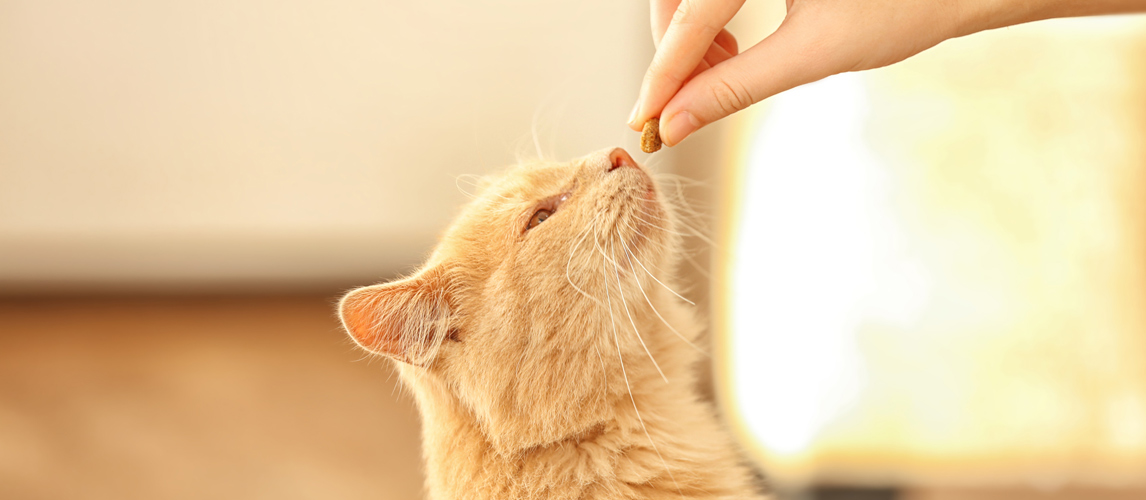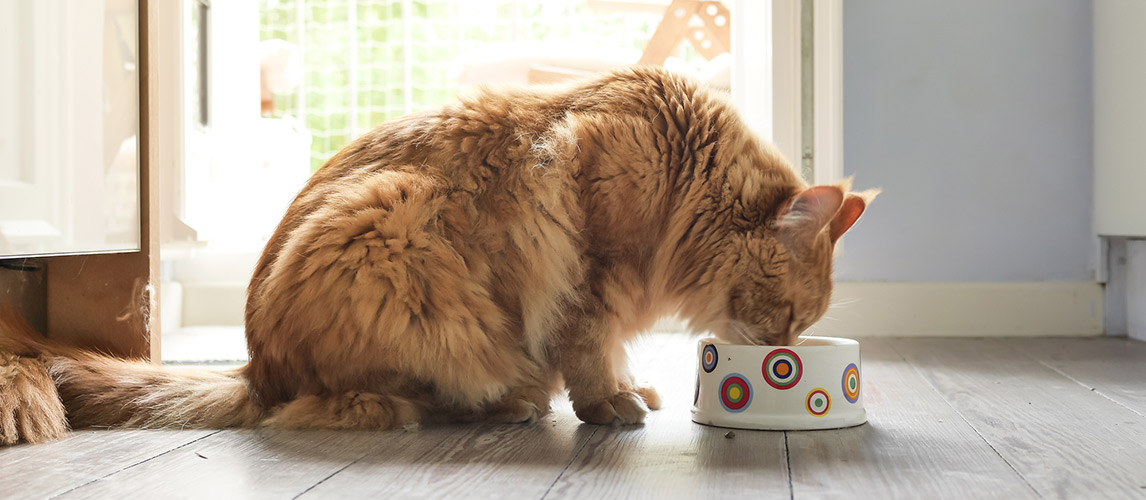For some cats, there’s nothing better than trying to share a plate of food with their humans. For some owners, there’s nothing more panic-inducing. What human foods can cats eat? Is anything on your dinner plate that will make your cat off color?
It might surprise you to know that there are a few people foods that would actually be good for your cat. While most of your cat’s diet should be a high quality, complete nutrition cat food, you can still give some human food as a treat every so often. He’ll love you for it!
Meat
Cats are carnivores. They’re known as obligate carnivores. Whereas dogs and people are omnivores and need protein from other sources, cats don’t. Meat is the only type of protein that can meet a cat’s nutritional needs.
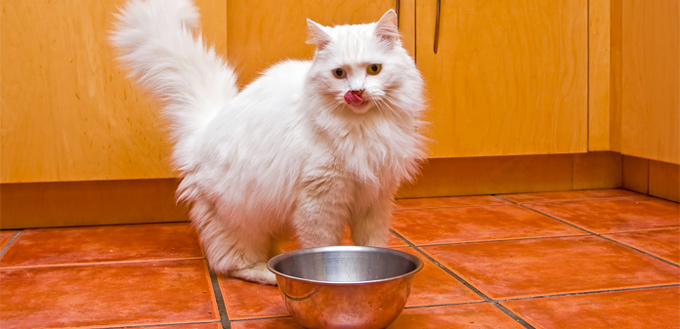
So you can safely give your cat bits of cooked beef, chicken, turkey, and little bits of lean deli meats. You shouldn’t give your cat raw or spoiled meat. It’s likely to make him sick. A good rule of thumb is if you wouldn’t want to eat it, then your cat shouldn’t be eating it either.
Salmon
When you go cat food shopping, you might notice that salmon is one of the most popular flavors in many of the commercial cat foods. It’s full of omega-3 fatty acids, and proteins, so it’s really good for your cat and has many health benefits. Salmon does need to be cooked before you let your feline friend have a bite. You also shouldn’t let your cat eat tinned salmon out of the tin. There’s a high risk of him cutting his tongue. You should also try to choose fresh salmon over tinned, and always avoid any salmon that comes in oil.
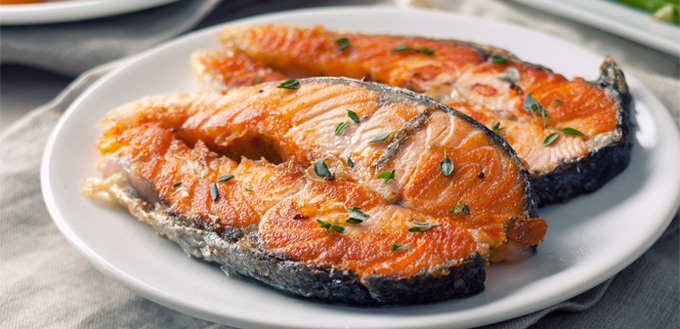
Other Fish
It’s not just salmon that can be offered to your fur-baby. Some cats will also go crazy for tuna, or mackerel. These fish also contain omega fatty acids, but there is some controversy over whether or not cats should eat them. Most veterinarians agree that cooked fish is absolutely fine as an occasional treat. Always cook any fish your cat is going to eat, and always choose fresh fish over tinned. If you do use tinned fish, avoid any that are ‘in oil’. The oil can be very unhealthy and can cause some very painful symptoms, such as abdominal pain, hypersensitivity, depression, anorexia and can even be fatal. If you do have concerns over feeding fish to your cat, but you still want them to get all the health benefits fish can give, then you might consider fish oil capsules.
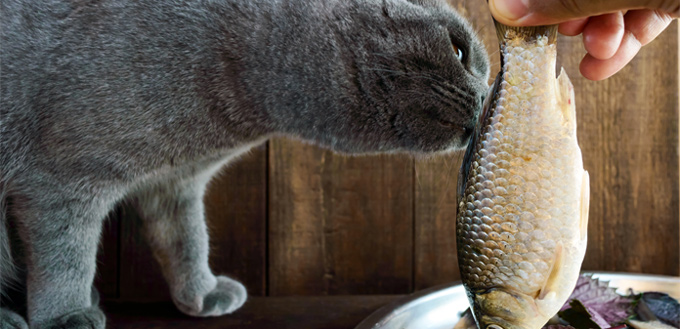
Eggs
Eggs are little nutritional powerhouses. They’re high in protein, vitamins, and amino acids. In fact, they’re a feline appropriate superfood. However, some cats may be allergic to eggs, so start by offering small samples of cooked egg, or scrambled eggs. It’s never a good idea to give your cat raw eggs. Firstly, they could get food poisoning, just like people can from raw eggs. Secondly, raw egg white contains a protein called avidin, and this protein interferes with how Vitamin B biotin is absorbed. Biotin is what keeps your cat’s coat shiny, sleek and healthy.
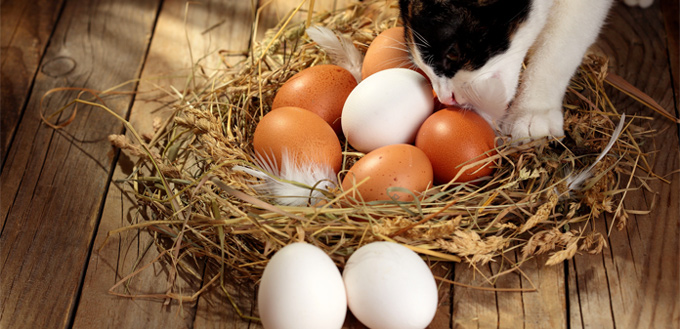
Cheese
Cats are supposed to like milk, right? Except that the majority of cats are actually lactose intolerant. Most cats shouldn’t be given milk, but they might be able to tolerate and enjoy small pieces of cheese. Cheese should be thought of as a treat, and it shouldn’t be part of your cat’s main diet. You should also watch for signs that it doesn’t agree with your cat, like a change in the stool.
Yogurt
Yogurt is full of protein, calcium, and probiotics, all of which are very good for your cat’s health. It’s still a dairy product but it’s usually easier for cats to digest. The lactose in the milk is usually broken down in the culturing process, which often means that most cats can eat yogurt. Make sure to choose a plain yogurt made from whole milk, without vanilla, or sweeteners, and only give a very small amount. Leave a day or two in between samples to make sure that your cat doesn’t have any stomach upset. If your cat can’t stomach whole milk yogurt, then you may want to try a coconut milk yogurt.
Related Post: Probiotics for Cats
Bread
Bread can be a source of fiber and protein, but you shouldn’t offer white bread. Instead offer wholemeal, or whole grain bread. Bread can’t be the main staple in your cat’s diet, but it can be a healthy occasional treat.
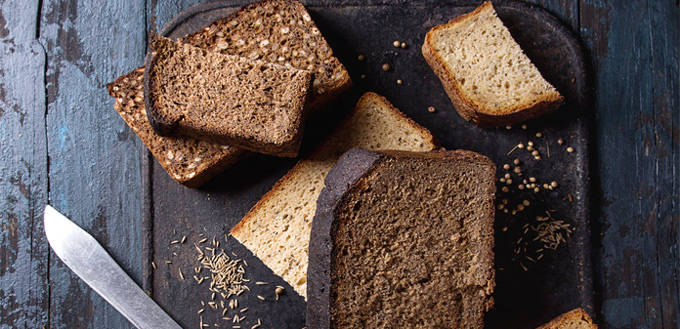
Fruit
Cats are carnivores, but their bodies can still process a small amount of fruit. Cantaloupe, in particular, is packed with antioxidants, and beta-carotene, so it’s really good for your cat’s skin and eyes healthy. Make sure that you have removed any seeds, and ensure that you only give very small amounts.
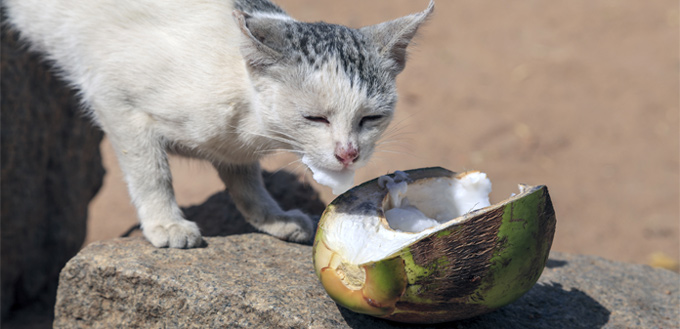
Your cat can also eat small amounts of banana. It has loads of potassium, but it’s also high in sugars, so if it’s fed too much, it can contribute to weight gain. Small slices as an occasional treat can be very good for your cats.
Other fruits that you can feed your cat include:
- Apples: High fiber, and full of vitamins A and C, but make sure you peel them and remove the core.
- Apricots: Packed with potassium, and beta-carotene, but make sure that you have removed the stem, leaves, and pit.
- Blueberries: These are full of antioxidants, vitamin C, and fiber. They can also help to prevent urinary infections and improve night vision.
- Cranberries: Your cat may not like the tart taste of cranberries, but they are full of vitamin C, manganese, and fiber. They can be fed raw, cooked, or even dried, but you should try to avoid cranberry juice or sauce due to the sugar.
- Mango: Mango needs to have the skin and pit removed before you can offer any to your cats.
- Pears: You’ll need to peel and de-seed a pear before you can give any to your cat, but this fruit has vitamin A, vitamin C and may have anti-cancer properties.
- Pineapple: Your cat may not like the taste of pineapple, but if he does, only give him small amounts. It’s full of folate, zinc, and other vitamins and minerals, but it’s also very sugary. You should remove the skin and the core before offering any to your cat.
- Raspberries: Raspberries can be given in very small amounts. They have small amounts of Xylitol, a sweetener that can be fatal to cats, and dogs. However, they can be given as an occasional treat, and they have fiber, vitamin C, and anti-inflammatory properties.
- Strawberries: Strawberries are full of nutrients, and can help boost your cat’s immune system. They can have fresh or frozen, and you could even puree the strawberries to serve with their regular food.
- Watermelon: Watermelon has masses of potassium, vitamin A, C, and B-6. It has almost 92% water, so it’s great for helping keep your cat hydrated as well.
Vegetables
There’s a number of vegetables that you can feed your cat. Some can be fed raw, but you should steam or boil others to make them easier to digest.
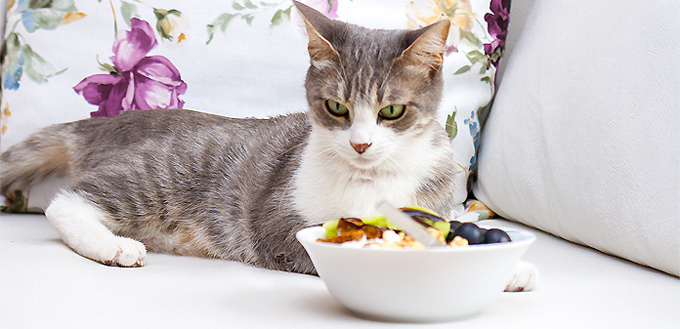
Your cat may prefer to eat pureed vegetables or baby food veggies, but make sure you only use foods without garlic or onions.
- Asparagus: Your cat might not have any interest in asparagus, but it is high in fiber, vitamins, and potassium. You should only give him small pieces, and only as an occasional treat.
- Broccoli: This is packed with fiber, and vitamin C, so try your cat to see if he wants to nibble on a floret.
- Brussels Sprouts: Many cats will turn their nose up at Brussels sprouts, but if your cat is interested, make sure that it’s cooked soft, and cut into small pieces.
- Cabbage: You can offer small pieces of cooked cabbage as an occasional treat. It can help digestion, improve the skin and coat, and it has some cancer-fighting properties.
- Carrots: Carrots are high in fiber, and beta-carotene. They’re great for healthy skin and eyes.
- Cauliflower: Cooked cauliflower can help digestion, is full of antioxidants, and vitamins. You need to take care of how much your cat eats though, as too much can give him an upset stomach.
- Cucumber: Slices of cucumber contain lots of vitamins K, C and magnesium, and may help to lower the blood pressure.
- Green beans: Fresh, or frozen green beans are full of protein and iron. If you’re using canned, choose sodium free.
- Lettuce: Lettuce adds water and fiber, helping to keep your pet hydrated. Slice it thinly, and serve on top of your cat’s regular food.
- Pumpkin: You can offer small bits of pumpkin to your cat if he’ll eat it. It’s high in vitamins, minerals, fiber, and water. It may help relieve constipation and diarrhea. Always use fresh pumpkin, and avoid pumpkin pie filling, which can have added spices, and sugars.
- Peas: Peas are packed with vitamin B, thiamin, and potassium, so they can help with bone health, and energy levels. You can give them as a snack, or you can add them to your cat’s regular food.
- Spinach: This is another feline superfood. It has pretty much every vitamin and mineral, so can help with every aspect of your cat’s health. Only give small amounts, and don’t give it to cats with kidney problems.
- Sweet potato: Sweet potato is similar to pumpkin, but is higher in nutrients, vitamins, and minerals. Offer small cooked amounts.
- Zucchini: Packed full of vitamin C, magnesium, and potassium, zucchini can help protect against infection, and improve cardiovascular function.
Some cats may be more interested in some of these human foods than others, and some may need encouragement to try them. Let your cat sniff the food, and he’ll make up his own mind if he’s willing to try it. Some cats may only want to play with the food to begin, but he might try it eventually, so be patient. Remember, if you are using canned foods, always check the ingredients for added spices, sugars or salts.
Source:
- Dr. Nicole Silva, DVM, Human Foods That Are Dangerous for Cats, PetMD


